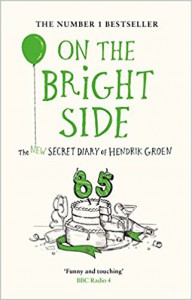The Old-But-Not-Dead Club strikes again. A truly inspiring read, whatever your age.

Thanks to Net Galley and to Penguin UK-Michael Joseph for providing me an ARC copy of this book that I freely chose to review.
A while back I read The Secret Diary of Hendrik Groen, 83 ¼ Years Old (check my review here) and loved it. I was on the lookout for the next one, and when I saw the next one was available for download at NetGalley I did not hesitate. It has now been published and I could not pass the chance to share my review.
Hendrik explains what has happened since his last diary (yes, he is older now) and decides to write his diary for another year, as a way to keep his brain going. He is now 85 and he needed some time to get over some of the sad events of the last book. But the Old-But-Not-Dead Club is still going strong, with new members and plans, including regularly exploring international cuisine (more or less), a short holiday abroad, and an attempt at local (extremely local) politics. Hendrik’s voice is as witty and observant as it was in the first book, although there is perhaps a grittier and darker note (he is feeling low, everything is getting tougher and unfortunately, life gets harder as the year goes along). But not all is doom and gloom and there are very funny moments, as well as some very sad ones. His comments about politics and world events, always seen from an elderly population’s perspective, are sharp and clear-sighted and will give readers pause. Some of them are local and I suspect I was not the only one who did not know who many of the people where or what anecdotes he referred to at times (I must admit that although I know a bit about Dutch painters, I know little about their politics or music, for example), but even if we cannot follow all the references in detail, unfortunately, they are easily translatable to social and political concerns we are likely to recognize, wherever we live. Funding cuts, social problems, concerns about health and social care, crime, terrorism, global warming feature prominently, although sometimes with a very peculiar twist.
The secondary characters are as wonderful and varied as in the previous book. Some of them have moved on (physically, mentally, or both), and we get to know better some of the ones that only briefly appeared in the previous volume. We also have new arrivals at the nursing home, and a more direct involvement in the home’s politics (with anxiety-provoking news present as well. Is the nursing home going to close?). I loved some of the proposed and adopted rules (a complaint-free zone to avoid wallowing in conversations about ailments and illnesses, a high-tea facilitated by the residents, an art exhibition, even if the artist is not the most sympathetic of characters…) and the sayings of the residents. Of course, life at a nursing home comes with its share of loss and although I don’t want to reveal too much, I can say the subject of death is treated in a realistic, respectful, and moving way.
I shed some of the quotes I highlighted, to give you a taster (although I recommend checking a sample and seeing what you think. And, although it is not necessary to read the first book first, I think it works better knowing the characters and their journey so far):
The idea of using care homes to look after the comfort, control and companionship of the elderly is fine in principle. It just fails in the execution. What old age homes actually stand for is infantilizing, dependence, and laziness.
One in four old people who break one or more hips die within the year. That number seems high to me, but it’s in the newspaper, so there is room for doubt.
It’s always astonished me to see the wide support clowns and crooks are able to muster. Watching old newsreels of that loudmouth Mussolini, you’d think now there’s a bloke only his mother could love. But no, millions of Italians loved him.(Yes, I’m sure this can make us all think of a few people).
Difficult new terms that tend to obscure rather than clarify, especially when uttered by policy-makers. It often has to do with hiding something —either a budget cut, or hot air, or both at once.
Managerial skills alone don’t make for better care, it only makes for cheaper one.
And, a great ending (and one we should all take up this year):
A new year —how you get through it is up to you, Groen; life doesn’t come with training wheels. Get this show on the road. As long as there’s life.
The tone of the book is bitter-sweet, and, as mentioned, it feels darker than the previous one, perhaps because Hendrik is even more aware of his limitations and those of his friends, and is increasingly faced with the problem of loneliness, and with thoughts about the future. But, overall, this is a book that makes us think about the zest for life, about living life to the full, and about making the best out of our capabilities. As I said on my previous review, I hope I can meet a Hendrik if I get to that age, and I’ll also make sure to join the Old-But-Not-Dead Club and be an agitator and enjoy life to the end. Don’t ever settle for the easy way out.
A great book for those interested in the subject of growing old, in great characters, and in an out-of-the-ordinary setting. It has plenty of adventures and events (even trips abroad and international cuisine), although it is not a book I’d recommend to people who love fast action and high-octane thrillers. If you enjoy first-person narrations, love older characters, and don’t mind thinking about the long-term (ish) future, I recommend this very inspiring book.
 3
3







